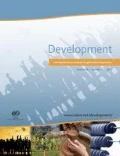Abstract
Catherine Walsh looks at how we can understand the emergence in the Andes Region and Ecuador of buen vivir, living well or collective well being, as the guiding principle for a new regimen of development. She asks if this really is a shift to new social and sustainable forms of development and what the experiment in the Andes suggests for today's rethinking of development institutions.
Notes
My interest as such is not with a critique of the authors associated with this new paradigm or their work, but rather with the paradigm's interpretation and application.
Functional interculturality can be understood as part of an institutional strategy that seeks to promote dialogue, tolerance, coexistence, and inclusion without necessarily addressing the causes of inequality; it makes diversity ‘functional’ to the system (Tubino, 2005). This contrasts with what I have referred to as ‘critical interculturality’, which initiates with a profound questioning of this system and seeks its major transformation in social, political, epistemic, and existential terms. That is, a new ordering of structures, institutions, and relations (Walsh, 2002, 2009).
It is also a central component of the Bolivian Constitution, passed in popular referendum in January 2009.
See Escobar (2009) for a similar critique.
References
Acosta, Alberto (2008) ‘El Buen Vivir, una oportunidad por construir’, Ecuador debate 75: 33–48.
Delgado, Freddy (2006) ‘Presentación’, in Freddy Delgado and Juan Carlos Mariscal (eds.) Educación intra e intercultural. Alternativas a la reforma educativa neocolonizadora, pp 9–16, La Paz: Plural.
Escobar, Arturo (2009) ‘Una minga para el desarrollo’, América Latina en movimiento, No. 445, pp 26–30, June Quito: ALAI.
Gudynas, Eduardo (2009) El mandato ecológico. Drecehos de la naturaleza y políticas ambientales en la nueva Constitución, Quito: Abya Yala.
Guiñazu, Maria Cecilia (2008) ‘Ciudadanía y desarrollo humano en América Latina’, in Revista Latinoamericana de Desarrollo Humano, No. 46, UNDP, July. http://www.revistadesarrollohumano.org.
Quijano, Aníbal (2000) ‘Coloniality of Power, Eurocentrism, and Latin America’, Nepantla. Views from South 1 (3): 533–580.
SENPLADES (2009) Recuperación del Estado nacional para alcanzar el buen vivir. Memoria Bienal 2007–2009, Quito: SENPLADES.
Sverdlick, Ingrid (2002) ‘Reseña de Educación en tiempos de neoliberalismo de Jurjo Torres (Madrid, Morata, 2001)’, Education Review digital copy, http://edrev.asu.edu/reviews/revs18.htm.
Tubino, Fidel (2005) ‘La interculturalidad crítica como proyecto ético-político’, Encuentro continental de educadores agustinos, Lima, pp 24–28, http://oala.villanova.edu/congresos/educación/lima-ponen-02.html.
Viteri Gualinga, Carlos (2004) ‘Visión indígena del desarrollo en la Amazonía’, http://colombia.indymedia.org/mail.php?id=14295.
Walsh, Catherine (2002) ‘(De)Construir la interculturalidad. Consideraciones críticas desde la política, la colonialidad y los movimientos indígenas y negros en el Ecuador’, in Norma Fuller (ed.) Interculturalidad y Política, Lima: Red de Apoyo de las Ciencias Sociales.
Walsh, Catherine (2009) Interculturalidad, Estado, Sociedad. Luchas (de)coloniales de nuestra época, Quito: Universidad Andina Simón Bolívar/Abya Yala.
Additional information
Looks at how collective well-being, is emerging as a guiding principle for a new regimen of development
Rights and permissions
About this article
Cite this article
Walsh, C. Development as Buen Vivir: Institutional arrangements and (de)colonial entanglements. Development 53, 15–21 (2010). https://doi.org/10.1057/dev.2009.93
Published:
Issue Date:
DOI: https://doi.org/10.1057/dev.2009.93

